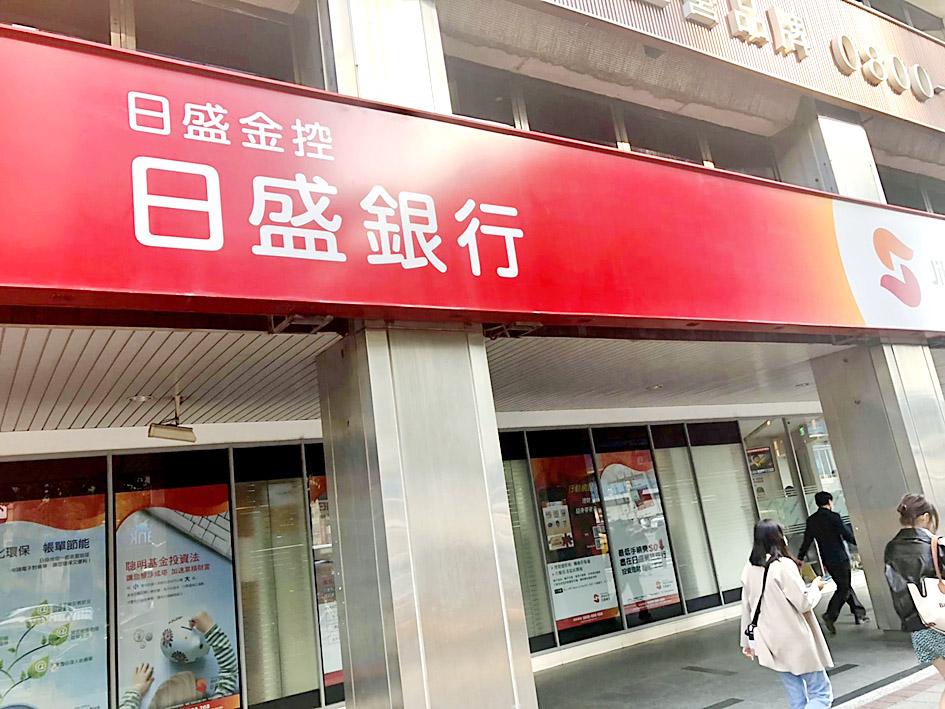The Financial Supervisory Commission (FSC) yesterday fined Hong Kong-based Capital Target Ltd (CTL, 建群), a major shareholder of Jih Sun Financial Holding Co (日盛金控), NT$25 million (US$898,569) for its faulty beneficiary disclosure and ordered CTL to offload part of its stake in Jih Sun within a year.
CTL holds a 24.09 percent stake in Jih Sun and the commission would allow the company to retain a 5 percent stake, Banking Bureau Deputy Director Sherri Chuang (莊秀媛) told a videoconference, adding that its regulations require any shareholder with more than a 5 percent stake in a local financial conglomerate to reveal its beneficiaries.
The commission would not be concerned if CTL sells its shares to Fubon Financial Holding Co (富邦金控), which has gained majority control of Jih Sun, or other buyers, but it must sell the 19.09 percent stake within a year, she added.

Photo: Kelson Wang, Taipei Times
The commission started a probe into CTL’s shareholder structure in July last year amid market speculation that the firm is owned by Chinese tycoon Xiao Jianhua (肖建華), head of the Chinese conglomerate Tomorrow Holding Ltd (明天控股).
CTL at the time told the commission that its beneficiary was Derek Chen (陳銘達), the same information it disclosed in 2009 when it applied to invest in Jih Sun.
Derek Chen, a Taiwanese, said he has no business relationship with Xiao and that he co-owned CTL with two female investors, surnamed Chen (陳) and Li (黎), with two of the three having formerly served as board members of Jih Sun.
However, the commission found their information suspicious, Chuang said.
“We talked to Derek Chen and the two other investors in person or by videoconference, and found that their stories did not match,” she said, referring to questions such as why they formed a joint investment and where their funds came from.
CTL is wholly owned by Hong Kong-based Best Fortune Investments Ltd, which is 40 percent owned by Derek Chen and 60 percent by another overseas company coheld by Derek Chen and his female partners, Chuang said.
However, the three failed to present fund flow records to prove that the money used to invest in Jih Sun came from their own pockets, Chuang said.
“Without any proof, we found their stories unbelievable,” she said.
The commission said it concluded that the three were not CTL’s real beneficiaries and decided to fine the firm NT$25 million, half of the maximum fine of NT$50 million.
It is the first time that the commission has punished a company for faulty beneficiary disclosures since the regulations were tightened last year.

NEW IDENTITY: Known for its software, India has expanded into hardware, with its semiconductor industry growing from US$38bn in 2023 to US$45bn to US$50bn India on Saturday inaugurated its first semiconductor assembly and test facility, a milestone in the government’s push to reduce dependence on foreign chipmakers and stake a claim in a sector dominated by China. Indian Prime Minister Narendra Modi opened US firm Micron Technology Inc’s semiconductor assembly, test and packaging unit in his home state of Gujarat, hailing the “dawn of a new era” for India’s technology ambitions. “When young Indians look back in the future, they will see this decade as the turning point in our tech future,” Modi told the event, which was broadcast on his YouTube channel. The plant would convert

‘SEISMIC SHIFT’: The researcher forecast there would be about 1.1 billion mobile shipments this year, down from 1.26 billion the prior year and erasing years of gains The global smartphone market is expected to contract 12.9 percent this year due to the unprecedented memorychip shortage, marking “a crisis like no other,” researcher International Data Corp (IDC) said. The new forecast, a dramatic revision down from earlier estimates, gives the latest accounting of the ongoing memory crunch that is affecting every corner of the electronics industry. The demand for advanced memory to power artificial intelligence (AI) tasks has drained global supply until well into next year and jeopardizes the business model of many smartphone makers. IDC forecast about 1.1 billion mobile shipments this year, down from 1.26 billion the prior

People stand in a Pokemon store in Tokyo on Thursday. One of the world highest-grossing franchises is celebrated its 30th anniversary yesterday.

Zimbabwe’s ban on raw lithium exports is forcing Chinese miners to rethink their strategy, speeding up plans to process the metal locally instead of shipping it to China’s vast rechargeable battery industry. The country is Africa’s largest lithium producer and has one of the world’s largest reserves, according to the US Geological Survey (USGS). Zimbabwe already banned the export of lithium ore in 2022 and last year announced it would halt exports of lithium concentrates from January next year. However, on Wednesday it imposed the ban with immediate effect, leaving unclear what the lithium mining sector would do in the